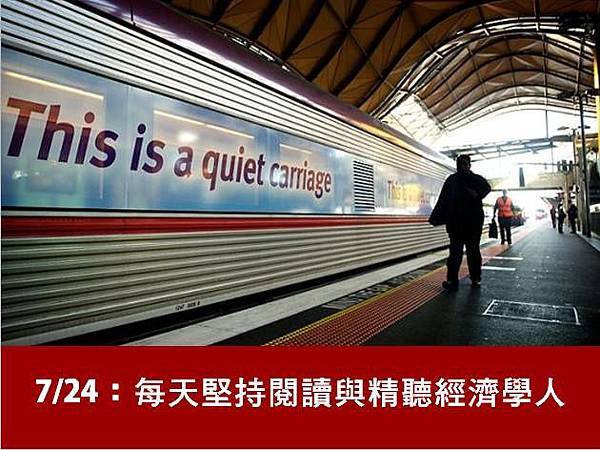
 今日主題:Noise pollution-- Shhhh! / 噪音污染--噓!小聲點!
今日主題:Noise pollution-- Shhhh! / 噪音污染--噓!小聲點!
 康康精選GRE&GMAT會考的主題,堅持每天精讀一定會進步的哦!!
康康精選GRE&GMAT會考的主題,堅持每天精讀一定會進步的哦!!
 MP3音檔 (按右鍵可下載聽):喜歡的同學,幫忙推或按讚哦~~
MP3音檔 (按右鍵可下載聽):喜歡的同學,幫忙推或按讚哦~~
http://xia2.kekenet.com/Sou…/2016/…/eco160622_0757265mfh.mp3
 只有音檔怎夠,聽不懂地方,不用怕,康康幫你準備好中英文稿了:
只有音檔怎夠,聽不懂地方,不用怕,康康幫你準備好中英文稿了:
 中英文稿:
中英文稿:
Noise pollution-- Shhhh!
噪音污染--噓!小聲點!
Why quiet carriages don’t work, and how they might be made to?
安靜車廂的推廣之途屢屢受挫。原因何在,如何改之?
QUIET carriages on trains are a nice idea: travellers voluntarily switch phones to silent, turn stereos off and keep chatter to a minimum. In reality, there is usually at least one inane babbler to break the silence.
在列車上設 “安靜車廂”是個不錯的想法:旅客們自覺將手機調成靜音,關掉隨身聽,輕聲地交談。而在現實中,通常至少會蹦出一個無腦的大嘴巴打破車廂的寧靜氣氛。
A couple of problems prevent peaceful trips. First, there is a sorting problem: some passengers end up in the quiet carriage by accident and are not aware of the rules. Second, there is a commitment problem: noise is sometimes made by travellers who choose the quiet carriage but find an important call hard to ignore.
安靜之旅基於以下一些原因無法實現。首先是車廂分類問題:一些乘客陰差陽錯的坐到了安靜車廂,而沒有留意乘車守則。其次是乘車義務問題:選擇就坐安靜車廂的乘客在途中接到一通無法忽視的重要電話,無奈之下發出了聲響。
The train operators are trying to find answers. Trains in Queensland Australia, are having permanent signs added to show exactly what is expected; a British operator has invested in signal-jamming technology to prevent phone calls. Microeconomics suggests another approach: putting a price on noise.
列車運營商正試圖找尋解決之道。澳大利亞昆士蘭州的火車裡常設標識,提醒乘客遵守乘車守則;英國的一家列車運營商引用信號干擾技術來避免電話騷擾。而微觀經濟學則提出了另一種方法——金錢同噪音掛鉤。
Fining people for making a din would surely dissuade the polluter and is a neat solution in theory, but it requires costly monitoring and enforcement. Another tack would be to use prices to separate quiet and noisy passengers—in effect, creating a market for silence. A simple idea would be to sell access to the quiet carriage as an optional extra when the ticket is bought. Making the quiet coach both an active choice and a costly one would dissuade many of those who do not value a peaceful ride.
開噪音罰單肯定會減少雜訊污染者,並且從理論上講乃一劑良方,但此方案需耗費大量監管和執行費。另一種方案是從票價上區分喜靜的和喜鬧的乘客,實際上是開闢“花錢買清靜”的交易。一種簡單的區分方法是,售票時提供安靜車廂選項,乘客可選擇支付額外費用在安靜區就坐。如此一來,“安靜座位”不僅可由乘客主動選擇,高票價還可將大量不珍惜安靜旅途的人拒之門外。
Charging may also solve the commitment problem. This is particularly tricky, as attitudes to noise can change during the journey. Some passengers would pay the quiet premium but still chatter away when some vital news arrives. Schemes that reward the silent—a ratings system among fellow passengers, for example—could help. The idea is that losing your hard-won reputation offsets the short-term gain from using the phone. But such a system also fails the simplicity test.
收費也有可能解決義務問題。乘客對待噪音的態度在旅途中或多或少會有所改變,這就使得義務問題變得尤為複雜——有些乘客雖然願意額外花錢到安靜車廂就坐,而在看到某些重要新聞時,仍舊按耐不住自己開始喋喋不休。旨在獎勵安靜乘車旅客的獎勵計畫或大有裨益。例如,同車乘客打分系統,理念是以來之不易的聲譽換取接電話來帶的片刻享受。但該系統也不會通過易用性測試。
A 2010 book by George Akerlof and Rachel Kranton argues that “norms”—feelings about how everyone should behave—also play a role in decision-making. Charging a price, even if just a token amount, means the quiet carriage becomes a service that fellow passengers have bought, not just a preference they have expressed. Perhaps different norms would come into play, encouraging calm. If not, a personal bubble is always an option: noise-cancelling headphones start at around $50.
喬治•阿克爾洛夫和瑞秋•克拉頓在2010年出版的一書中認為,人類對個體該如何行止的感覺就是“行為規範”,這種規範也影響決策過程。即便是象徵性收取少量金額,單憑收費這一行為,就意味著安靜車廂不再是同行乘客的偏好之選,而是他們所購買的一項服務。或許在鼓勵人們保持車廂安靜時,應該引入不同的行為規範。若此方案也行不通,那麼在列車上出售$50起價的降噪耳機,創造“個人空間”總是不二之選。


 留言列表
留言列表
